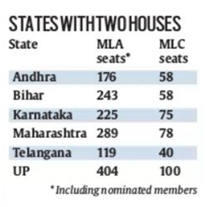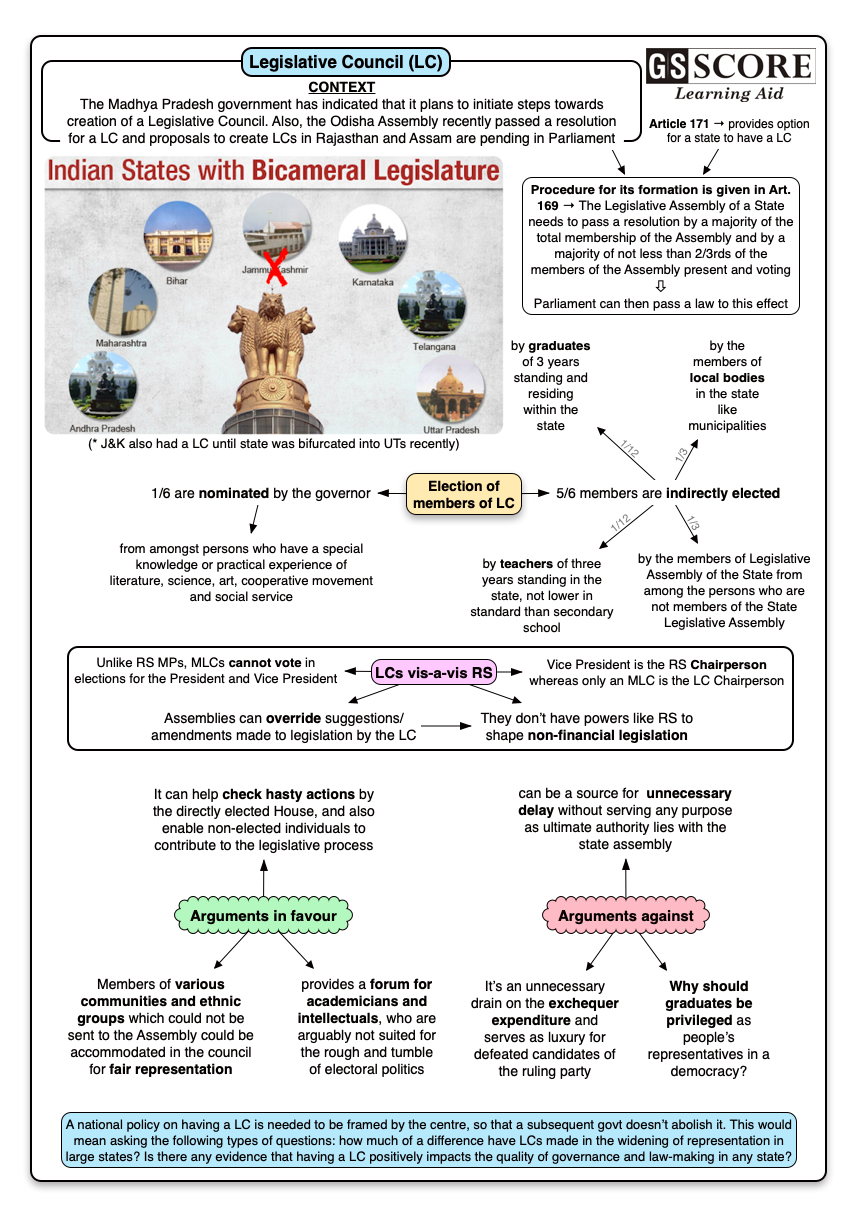

The Madhya Pradesh government has indicated that it plans to initiate steps towards creation of a Legislative Council.
Issue
Context
The Madhya Pradesh government has indicated that it plans to initiate steps towards creation of a Legislative Council.
BACKGROUND
Bicameralism is the practice of having two Houses of Parliament. At the State level, the equivalent of the Lok Sabha is the Vidhan Sabha (Legislative Assembly), and that of the Rajya Sabha is the Vidhan Parishad (Legislative Council).
Upper House is considered important in the parliamentary system, as only a third of the seats are filled every two years and it therefore acts as a check against potential impetuousness of electoral majorities in the Lower House.
With members mostly indirectly elected, the Upper House also ensures that individuals who might not be cut out for the rough-and-tumble of direct elections too are able to contribute to the legislative process.
Under Article 169, Parliament may by law create or abolish the second chamber in a State if the Legislative Assembly of that State passes a resolution to that effect by a special majority.
At present, six Indian States have bicameral legislatures. Some argue that unlike the Rajya Sabha, the Vidhan Parishad does not serve its purpose and poses a strain on States’ finances.
States with legislative councils
- Currently, six states have Legislative Councils. Jammu and Kashmir too had one, until the state was bifurcated into the Union Territories of J&K and Ladakh.

- The Odisha Assembly recently passed a resolution for a Legislative Council. Proposals to create Councils in Rajasthan and Assam are pending in Parliament
Constitutional provisions
- Article 171 of the Constitution provides option for a state to have a Legislative Council in addition to its Legislative Assembly.
- As in Rajya Sabha, members of a Legislative Council are not directly elected by voters.
- Manner of Election Of the total number of members of a legislative council:
-
- 1/3 are elected by the members of local bodies in the state like municipalities, district boards, etc.
- 1/12 are elected by graduates of three years standing and residing within the state
- 1/12 are elected by teachers of three years standing in the state, not lower in standard than secondary school,
- 1/3 are elected by the members of the legislative assembly of the state from amongst persons who are not members of the assembly, and
- the remainder are nominated by the governor from amongst persons who have a special knowledge or practical experience of literature, science, art, cooperative movement and social service.
Thus, 5/6 of the total number of members of a legislative council are indirectly elected and 1/6 are nominated by the governor.
- Procedure - Under Article 169, a Legislative Council can be formed “if the Legislative Assembly of the State passes a resolution to that effect by a majority of the total membership of the Assembly and by a majority of not less than two-thirds of the members of the Assembly present and voting”. Parliament can then pass a law to this effect.
Legislative council comparison with Rajya sabha
- The legislative power of the Councils is limited.
- Unlike Rajya Sabha which has substantial powers to shape non-financial legislation, Legislative Councils lack a constitutional mandate to do so.
- Assemblies can override suggestions/amendments made to legislation by the Council.
- Unlike Rajya Sabha MPs, MLCs cannot vote in elections for the President and Vice President.
- The Vice President is the Rajya Sabha Chairperson; an MLC is the Council Chairperson.
Analysis
Arguments against Legislative Councils
- Accommodating various political interests – parties need it to accommodate people who cannot be elected and are not nominated to other corporations or State bodies.
- It can be used to provide unnecessary delay without serving any purpose as ultimate authority lies with the state assembly.
- It is an unnecessary drain on the exchequer expenditure and becomes an unnecessary luxury for defeated candidates of the ruling party.
- Also graduates are no longer a rare breed; also, with dipping educational standards, a graduate degree is no guarantee of any real intellectual heft. And then again, why should graduates be privileged as people’s representatives in a democracy?
- Legislatures draw their talent both from the grassroots level and the higher echelons of learning. There are enough numbers of doctors, teachers and other professionals in most political parties today.
Arguments in favour of Legislative Councils
- A second House can help check hasty actions by the directly elected House, and also enable non-elected individuals to contribute to the legislative process
- It thus at least on paper, it provides a mechanism for a more sober and considered appraisal of legislation that a State may pass and act as a revising chamber.
- Sending legislation to the other house would involve some delay in the passing of a bill, and would ensure that there will be adequate time to scrutinise legislation before it is passed
- It provides a forum for academicians and intellectuals, who are arguably not suited for the rough and tumble of electoral politics.
- It thus provides wiser counsel to the State assemblies by including experts in Legislative council.
- Members of various communities and ethnic groups which could not be sent to the Assembly could be accommodated in the council for fair representation.
Way Forward
- Legislative Councils are subject to varied and inconclusive discussions around their creation, revival and abolishment from time to time whenever a state demands it.
- A national policy on having an Upper House in State legislatures is needed to be framed by the Union government, so that a subsequent government doesn’t abolish it.
- This would mean asking the following types of questions: how much of a difference have legislative councils made in the widening of representation in large states? Is there any evidence that having a legislative council positively impacts the quality of governance and law-making in any state?
Learning Aid



